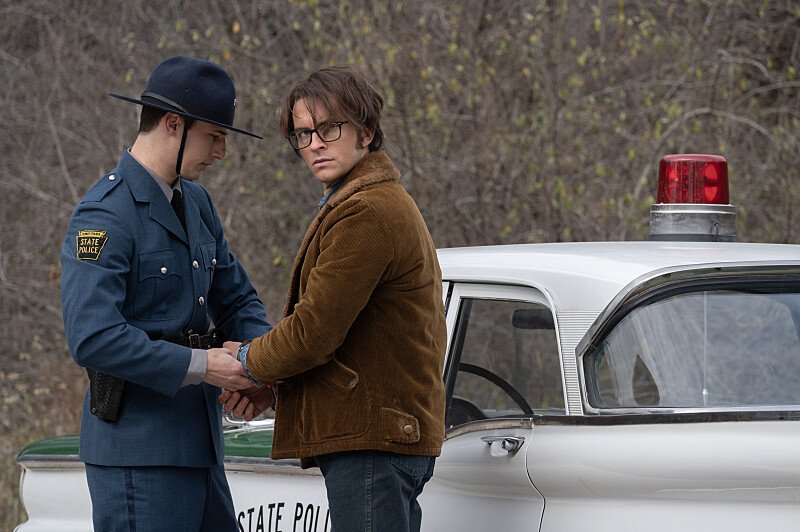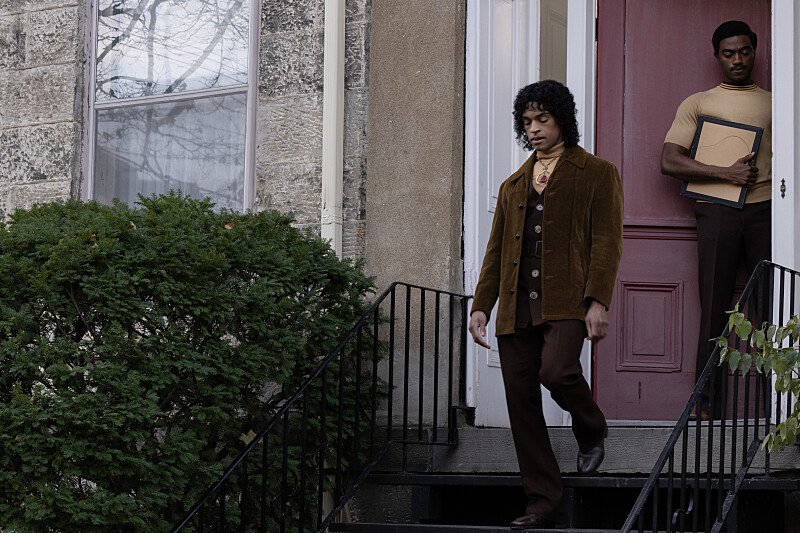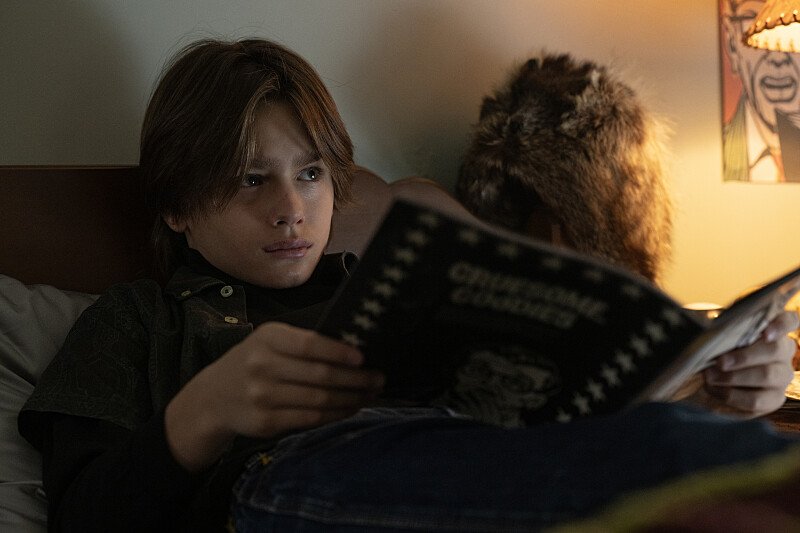[Fellow Travelers Recap w/ Joe Lipsett] "Beyond Measure" Divides Us as We Move into the 60s
TERRY
Well this is an odd one, Joe. After spending five episodes knee deep in McCarthyism and the political intrigue of queer people struggling under governmental oppression, “Beyond Measure” jumps forward to 1968 to tell a rather self-contained story that re-establishes where our trio of queer men - Tim (Jonathan Bailey), Hawk (Matthew Bomer) and Marcus (Jelani Alladin) - are at in their lives. Outside of a brief moment in the 80s where Hawk comments about Tim’s prison tattoo and a couple flashbacks that fill in a few specific beats of Hawk’s relationship with Lucy (Allison Williams), “Beyond Measure” is firmly rooted in a specific turning point in Hawk and Tim’s relationship.
It opens with Tim and his fellow religious reactionaries nicely breaking into the Selective Service office in Baltimore to take draft cards and burn them to protest the Vietnam War. Cut to Hawk on the phone with Marcus, trying to get Tim a hiding place because not only are the police looking for him, but so is the FBI.
This gives us a brief look into Marcus’s current situation, taking care of his father Donald (Franklin Ojeda Smith), ignoring a goodbye letter from Frankie (Noah J. Ricketts) and attempting to sidestep the advances of childhood friend, Cynthia (Zarrin Darnell-Martin). It’s unfortunately another moment that continues to minimize Marcus’ story – we see less of him here than we have in previous episodes.
At least the episode gives Marcus the start of a happy ending. One that neither of our two leads seem to be heading towards.
Those brief moments aside, “Beyond Measure” is about Tim hiding from the law at the rundown cabin at Hawk and Lucy’s country house. It’s not the best time to be hiding there, though, because Lucy is throwing a party for the Stovers and has invited a large group of people. Here, we get a few flashbacks to Lucy finding out that her husband likes men through a letter Tim had stuck under Hawk’s apartment door (that she burned without showing Hawk), the firing of a contractor that Hawk was presumably messing around with and her insistence that Hawk give her a family.
That family in question comes in the form of Kimberly (Teagan Sellers) and beatnik-in-training Jackson (Etienne Kellici). It’s suggested through vague language and stereotypes that Jackson might not be straight, even though he hides a copy of Playboy in his nightstand. “He’s sensitive,” Tim tells Hawk at one point, with suggestive emphasis. And later Jackson embraces his father and cries, “I think there’s something wrong with me.”
Overall it’s a “nice” episode that catches us up but is relatively free of drama. Sure, Lucy gets drunk and makes out with Chet Stover (Wade Boger-O’Brien) and we see a little of the inner turmoil she’s dealing with. And, yeah, Tim is facing a prison sentence he is more than willing to embrace while Hawk warns what happens to “men like you” in there (“you mean men like us,” Tim replies). But for an episode that could have been a fiery crescendo of discovery, it feels almost like a filler episode.
And that’s a shame, in the overall narrative that Fellow Travelers is spinning. At this point, I almost wish that the show was split into at least two parts. More time spent digging into the political machinations of the 50s, for example, while a second season could dig into life in the 60s, maybe.
So much has happened since episode 5…which was one episode ago…and most of the juicy drama has been excised for this reunion. I wanted more from Tim’s time in the military, for instance. Hawk has become a rather boring character, but Tim? He’s lived in these intervening years and “Beyond Measure” doesn’t really catch us up on the experiences the two have lived apart. It’s a shame.
But over to you, Joe. When we last wrote, you were firmly in the “Hawk crossed a line” camp (can’t disagree!) and you thought it would color the rest of the show. So I’m curious what you thought of this rather interstitial episode? Did you want more of Marcus’s very brief interactions with his father and Frankie? We’ve barely even discussed Lucy in these recaps…did you want more from her outbursts of pain? And what about Hawk’s relationship with his son and his daughter and the hints of internalized homophobia therein?
JOE
Innnnteresting, Terry. I’m warmer on this episode than you, though I can’t disagree with your observations that this episode has a vaguely “filler” vibe. Considering how Fellow Travelers bounces around, though, I wonder if there’s still a chance we’ll see more of Tim’s experiences in Vietnam. That may be why I’m a bit more forgiving.
You also didn’t seem to connect as much to the insights gleaned from Hawk’s home life as me. While I could still care less whether he and Tim ultimately end up together (I’m not ready to forgive), I appreciated how “Beyond Measure” shows us what Lucy knows about her husband’s extracurricular activities.
There’s actually three timelines in play, not just two. As you mentioned, the very brief glimpse at the 80s, plus the 60s when Tim is hiding out at Hawk’s cottage.
And then there’s the third (earlier) timeline when Lucy finally convinces Hawk to give up his apartment, burns Tim’s letter, and demands that Hawk give her a child to fulfill their somewhat empty marriage. We also learn that Lucy knew something untoward was going on with the gardener, because she definitely fires that guy when she spots Hawk cozying up to him.
It’s hard because the show’s hair and make-up team try to use Williams’ changing hairstyle to differentiate the timelines, but it’s not quite noticeable enough to always catch.
All this to say that, even though we’ve seen these kinds of “queer men lying to their wives” storylines before, I thought this was mostly fine. More than anything, I was happy to see Williams get more to do. She’s been something of a utility player for most of the series, so I was curious to see when (or if) Fellow Travelers would give her the chance to, you know, do something.
Could it have been bigger? Sure, but the show admittedly doesn’t seem interested in histrionics and big speeches. I’ve been enjoying more of the quiet pain that she and Tim share when they briefly encounter each other; there’s a wariness to the way they circle each other and their love for this one shitty dude.
Speaking of Hawk, it was interesting to see how he parents his kids (or rather, struggles to parent them). It’s clear that Kimberly is daddy’s little girl and Jackson is struggling to measure up to whatever expectations Hawk has of him (again: familiar), but it’s intriguing to see a situation where Hawk can’t get by simply on his charisma and charm. You can’t schmooze or blackmail kids very successfully, and it was meaningful to see Tim instantly connect with Jackson when Hawk has failed to do so.
Of course, that’s easier to explain if Jackson is, in fact, revealed to be queer. That would also create a nice callback to Hawk’s relationship with Senator Smith and Leonard.
So yeah, overall, narratively “Beyond Measure” doesn’t do much to advance the plot, but I liked the glimpse into Hawk’s marriage. The time jump did feel severe, though, and having no glimpse or mention of McCarthy, Schine, or Cohn made some of the last few episodes feel retroactively less important (Are we done with them? Who can say?!)
All in all, I’m still mostly on board with this series, even if the somewhat pedestrian storytelling and lack of character focus is a tad disappointing. The performances are still carrying the day, Terry, but I can’t see our issues with the series being resolved in its last two episodes.
Perhaps episode seven will prove me wrong? We’ll see when we hop back to QueerHorrorMovies and another time jump (we’re into the 70s!) with the penultimate episode, “White Nights.”


![[Fellow Travelers Recap w/ Joe Lipsett] "Beyond Measure" Divides Us as We Move into the 60s](https://images.squarespace-cdn.com/content/v1/5b39608d75f9eef54c62c3f0/1701363037088-09OEZ4P8ISTV9HBFGPNW/FellowTravelers_106_0108_R-cbaeefde4e422160.JPG)







![[Fellow Travelers Recap w/ Joe Lipsett] "Your Nuts Roasting on an Open Fire" Turns Up the Fire on Everyone](https://images.squarespace-cdn.com/content/v1/5b39608d75f9eef54c62c3f0/1700171663978-NUBDXCVPK03DY9NK1QYF/FellowTravelers_104_0060_R-cf5343d5ce8f4810.JPG)
![[Fellow Travelers Recap w/ Joe Lipsett] "Bulletproof" Ups the Tension as It Becomes Clear that No One is Safe](https://images.squarespace-cdn.com/content/v1/5b39608d75f9eef54c62c3f0/1698971753363-JDXHVJ6W8WP8I5RNBDAF/FellowTravelers_102_SG_0009_R-69f46db2d3a7fecb.JPG)
![[Fellow Travelers Recap w/ Joe Lipsett] "Make it Easy" Brings Tim and Hawk's Rollercoaster Series to an End](https://images.squarespace-cdn.com/content/v1/5b39608d75f9eef54c62c3f0/1702572906876-PQ09UY8N8Q1L4CEVXX0Z/FellowTravelers_108_0836_R-dfe2772069ea5621.JPEG)